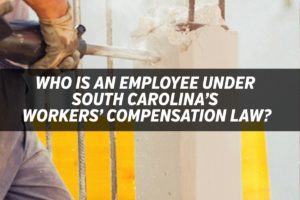In mid-September, Circuit Judge Jorge Cueto held that Florida’s workers’ compensation law is unconstitutional and essentially changed the legal landscape for employees in Miami-Dade counties. Employees in those affected counties are essentially barred from filing claims against their employer for injuries incurred while on the job—and Cueto’s ruling may have other far-reaching consequences, such as employers being able to turn around and say that the employee assumed the risk by working. Imagine an injured construction worker being blamed for using a jackhammer while on the job! Luckily, South Carolina’s Workers’ Compensation laws are still active and in effect. But some people may be not familiar with our workers’ compensaton laws, so read on ahead for a brief primer on the law that employees can rely on when they may need it the most.
Who is an Employee and Why Does it Matter?
Under South Carolina law, an employee who is injured on the job may qualify for benefits such as workers’ compensation. The workers’ compensation benefit does not apply to employees who are considered freelancers or independent contractors—they are workers who do not file an IRS Form W-2.
Under the law, an employee is someone who works for the benefit of and under the control or supervision of an employer. The employer will dictate where, when and what the employee is working on in a given day, along with how the employee is expected to perform. For example, Laborer works under Supervisor and Laborer is told where and when to build a house for Homeowner, as well as what materials to use. There is also a plan outside Laborer’s control, such as Architect’s blueprints. Therefore, Laborer may be considered an employee.
On the other hand, Architect may be considered an independent contractor because Architect can draft the blueprints in or out of the office and it may be subject to Homeowner’s approval, but not Homeowner’s control or supervision. Architect can work on the blueprints in the office, at home or even at the beach—the location doesn’t matter as long as Homeowner approves of the work. So assuming that Laborer is filing Form W-2 and is listed as an employee, then Laborer should qualify for workers’ compensation over a workplace injury, such as a fall off the roof. On the other hand, Architect is most likely an independent contractor who files IRS Form 1099, and he will not qualify for workers’ compensation if he slips on a conch on the beach while working on Homeowners’ blueprints.
Persons who are unsure of their legal status as a worker or have a reason to believe that their employers have misclassified them as independent contractors instead of employees or vice versa should consult an experienced workers’ compensation attorney. An injury can occur at any time—including at work—and a worker who is told that he or she do not qualify for employee-related benefits like workers’ compensation may find that their bad situation has turned worse.

David Price is a Personal Injury, Civil Litigation, Collections, and Criminal Defense Attorney who practices in Greenville, SC. He graduated from the University of Georgia School of Law, and has been practicing law for 12 years. David Price believes in helping those who have been injured. Learn more about his experience by clicking here.

